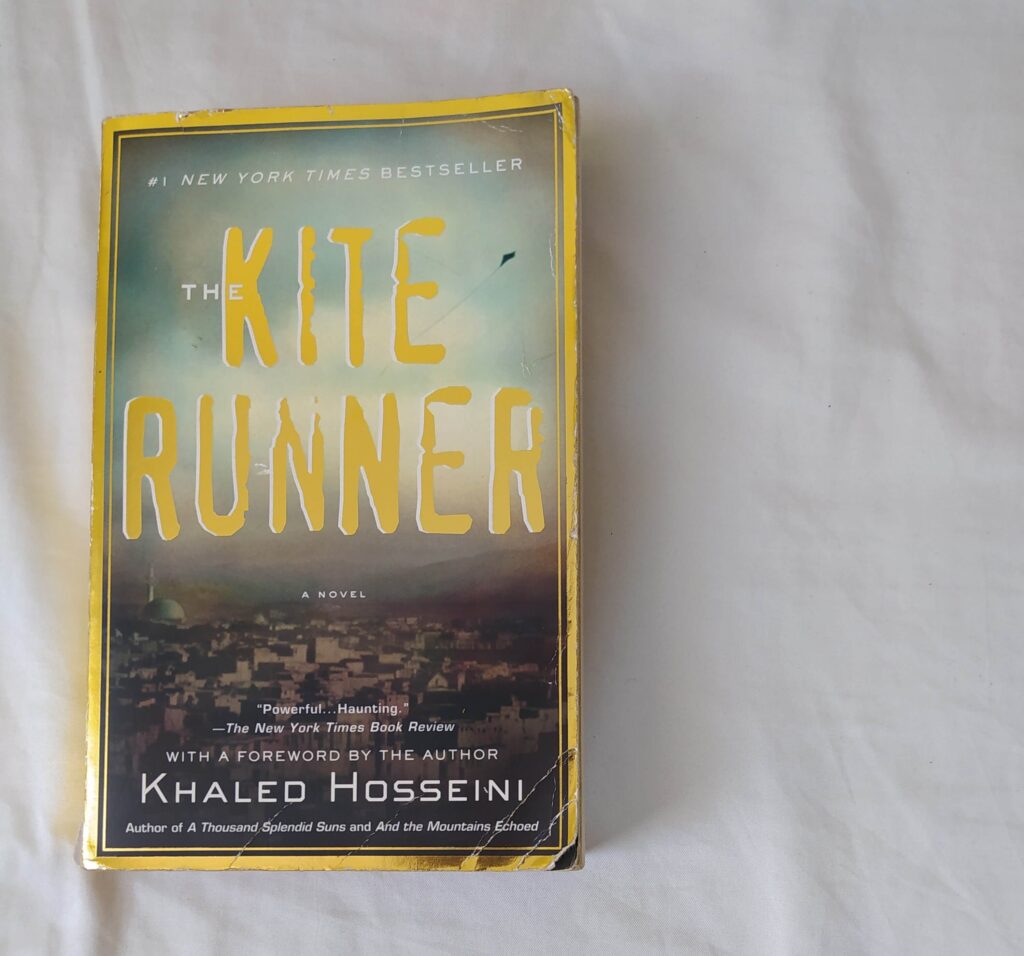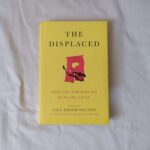The Kite Runner (2003) by Khaled Hosseini is a raw and deeply affecting book that will stay with me for a long time.
The novel follows the life of Amir, a Pashtun boy, as a kid chasing kites in the peaceful 1950s Afghanistan, to his family’s escape in the 70s to Pakistan, and eventual resettling in America as a young married man. This simplistic summary of The Kite Runner, however, doesn’t begin to unravel the heartbreaking narrative that follows the main character’s life until the end. Khaled Hosseini’s brilliant writing shines throughout the story and especially through the vivid depictions of various raw human emotions, including shame, guilt, pride, remorse, and redemption that the characters go through. Though the themes felt heavy, I still found The Kite Runner by Khaled Hosseini a compelling easy-to-read book whose words and story flowed easily.
Quotes From The Kite Runner With Theme Analysis
Here are some of the quotes from The Kite Runner that I loved, along with a brief analysis of the plot context and themes associated with them. I hope they convince you to read this amazingly moving book!
“For you, a thousand times over” pg 2, 67, 239, and 371
This quote appears several times throughout the book. And while at its core is the theme of undying friendship and loyalty, it also represents different themes and circumstances in Amir’s life. The first time is chapter 1 when Amir receives a call from Rahim Khan requesting him to travel to Pakistan and see him. Amir takes a walk at Golden Gate Park where the sight of a pair of kites reminds him of his childhood and this phrase that his friend Hassan had said to him many years ago. At this point, this quote represents the theme of redemption as Amir recounts Hassan’s assault that he could’ve helped but didn’t. Rahim Khan’s call to return to Pakistan is a potential opportunity for Amir to right his wrongs.
The second time occurs when Amir wins the kite running competition and Hassan runs to retrieve their kite. Here, the quote explores Hassan’s friendship and loyalty towards Amir, which ironically, the latter betrays when he fails to stand up for Hassan against Assef and his friends in the alley.
Another instance occurs in a dream during Amir’s return to Pakistan when he spends a night in the desert under Farid’s elder brother’s roof. Amir dreams of Hassan’s murder and sees himself as the man behind the trigger. Hassan’s last words as he kneels, blindfolded, are “A thousand times over… For you a thousand times over.” The themes of guilt and regret are evident here as Amir is still haunted by his failure to help Hassan when he needed him. He sees himself as the man behind the trigger because he feels responsible for everything that befell Hassan and his family.
In the last instance, Amir is muttering the phrase to himself about Sohrab, Hassan’s son. He has successfully managed to rescue Sohrab from Afghanistan and brought him back to the US where he has better opportunities in life. Amir mutters these words as he runs after Sohrab’s kite, just as Hassan did years earlier when they were children. The most prominent theme here is redemption, as Amir feels a tiny sense of relief from Sohrab’s subtle smile.
“Children aren’t coloring books. You don’t get to fill them with your favorite colors” pg 21
Rahim Khan says this after Amir’s father, Baba, blatantly spells out his dissatisfaction with his son’s failure to take after him or inability to stand up for himself. Baba has tried introducing Amir to “manly” activities, such as playing soccer, spectating, and bullfighting, but the latter only seems to be interested in reading and writing. Similarly, Amir feels like he doesn’t match up to his father’s expectations of him and even attends the soccer and bullfighting matches for as long as possible to please Baba. This quote advances the complicated father-son relationship theme in the novel.
“And that’s the thing about people who mean everything they say. They think everyone else does too” pg 55
When Amir toys with Hassan’s loyalty and questions if he would eat dirt at Amir’s request, Hassan thinks that Amir is jesting. This famous quote paints the friendship between Amir and Hassan which seems one-sided and unconsciously rooted in the boys’ differences in social class, as well as Amir’s quest to gain Baba’s approval as the son he always wanted.
“Strangely, I was glad that someone knew me for who I really was; I was tired of pretending” pg 106
Amir senses that Ali knows everything, including his framing of Hassan for the stolen money and failing to intervene when Assef sodomized Hasan in the alley a few years back. Amir’s resignation at someone knowing him for who he truly is shows how important his quest for Baba’s love is, that he’s willing to betray and cause this much pain to everyone.
“Not a word passes between us, not because we have nothing to say, but because we don’t have to say anything — that’s how it is with people who are each other’s first memory.” pg 122
Amir recalls one of the many instances in his childhood when he spent time with Hassan and how their bond surpasses a friendship. It’s the memory that comes to mind when Baba tells him to think of something good or happy during their escape to Pakistan in a fuel tank. The fact that this is a happy and calming memory shows how important Hassan was in Amir’s life
“I reached across the table and put my hand on his. My student hand, clean and soft, on his laborer’s hand, grubby and calloused” pg 130
The contrast between Baba and Amir’s hands is an indication of the hardships that Baba and all immigrant families like them have to endure when they arrive in the US. The promise of a new peaceful life is riddled with changes that rob them of their dignity. Once a wealthy, popular, and philanthropic man in Kabul, Afghanistan, Baba is now forced to work menial jobs and live on food stamps in Fremont, California. It’s also an extension of the father-son relationship, where Baba is ready to make all these sacrifices to give Amir the best life possible.
“It may be unfair, but what happens in a few days, sometimes even a single day, can change the course of a whole lifetime” pg 142
Amir and Baba are talking about General Taheri’s daughter, Soraya, whose previous life choices have seemingly made her unsuitable for suitors and marriage according to Afghan customs. Baba says this statement as a reflection on her actions and as a caution to his son when he realizes that Amir has taken a liking to Soraya. This quote builds on the father-son relationship, where Baba is protective of Amir and wants what he thinks is best for him.
“And I would walk by, pretending not to know her, but dying to” pg 144
Amir is talking about his romantic interest in Soraya when he would watch her at her father’s stand and before he began speaking to her. This careful choice of words by Khaled Hosseini paints Amir’s passion towards Soraya in the broadest strokes possible, advancing the different types of love in The Kite Runner.
“Sad stories make good books” pg 147
During their first conversation with Soraya, Amir’s interest in the book she’s reading implies a bolder step and an official portrayal of interest. This quote is her reply and subtle symbolism of their past lives and foreshadows their future lives together.
“There was so much goodness in my life. So much happiness. I wondered whether I deserved any of it.” pg 183
Amir is happily married to Soraya, has bought a home, and just received the good news that his novel will be published. But despite all this, his past actions and everyone he betrayed still haunt him, so much that he feels undeserving of all the happiness in his current life. He feels guilty for experiencing this much happiness given all the pain he has caused in the past.
“Peace at last. But at what cost?” pg 201
Amir returns to Pakistan upon Rahim Khan’s request. Rahim is talking about the time when the Taliban came and for a moment it seemed like they had saved Afghanistan from further wars and destruction, only for them to continue reigning terror on the country. The Kite Runner book covers a historical period when the Afghanistan War started, the invasion of the Soviet Union which made Amir and millions of other Afghans refugees, and the eventual takeover by the Taliban in the 90s. When the Taliban came in and drove the Alliance out, there was a lot of celebration and most Afghans believed that the group was the savior the country needed but this was far from the truth because the group established strict religion-based rules and other ideological laws that soon became even more dangerous.
“The truth was no. The lie was yes. I settled for something in between. ‘I don’t know’” pg 202
This is Amir’s response when Rahim Khan asks him whether he would’ve wanted to receive letters and know about Hassan’s return to Baba’s house during the war. Amir’s true answer is a portrayal of the guilt he carries from when he betrayed Hassan, which is also supported by how he feels after speaking Hassan’s name for a long time: “Those thorny barbs of guilt bore into me once more, as if speaking his name had broken a spell, set them free to torment me anew.”
“It always hurts more to have and lose than to not have in the first place” pg 211
Rahim Khan is speaking about Hassan’s mother, Sanaubar, returning to his life for a few years until she died. Since Hassan grew up without his mother, having her for a few years and then losing her to death hurts more than not having her for his entire life. This quote is yet another portrayal of Khaled Hosseini’s ability to effectively evoke various emotions from a reader, as well as a continuation of the different types of losses that occur throughout The Kite Runner.
“I was still searching for the right words, and I was the writer in the room” pg 221
Amir is speechless for a moment when Rahim Khan asks and begs him to go back to Kabul and save Sohrab. Rahim Khan asks whether Baba was right to think of Hassan as a man who cannot fight for himself or other people, saying that his request is a dying wish. I love this quote and chose to include it in this list because it’s one of the instances Hosseini uses such subtle ironies to show the seriousness of the situation.
“One of the balls had come unscrewed. I stooped and tightened it. I wished I could fix my own life as easily.” pg 225
Amir is in a cafe in Pakistan after storming out of Rahim Khan’s apartment upon learning that Baba was Hassan’s real father. He feels betrayed by Baba and Rahim Khan and wishes all that mess could be fixed as easily as tightening balls on the table’s legs. The quote illustrates how Amir feels about his life through the brilliant use of a metaphor.
“There is only one sin. And that is theft… when you tell a lie, you steal someone’s right to the truth.” pg225
Amir recalls Baba’s words in the heat of the news he just found out about Hassan being his half-brother. He feels betrayed by Baba and unconsciously questions the man his father was for keeping such a truth away from him and Hassan.
“Earlier that morning, when I was certain no one was looking, I did something I had done 26 years earlier; I planted a fistful of crumpled money under a mattress” pg 242
When Amir spends a night in the desert at Farid’s brother’s house, he leaves a fistful of money under a mattress for the family as a form of charity; an act he had also done 26 years ago. Only then, he had put money under Hassan’s mattress and framed him for theft, leading to a betrayal that haunts him to date. Though unrelated, the author reminding us of the act he did years ago paints the money he leaves for the family as some sort of redemption.
“I wondered if that’s how forgiveness budded, not with the fanfare of epiphany, but with pain gathering its things, packing up, and slipping away unannounced in the middle of the night.” pg 359
On the first night of Sohrab’s arrival in the US, Amir is staring at a photo of Hassan and he realizes that he doesn’t feel the sting of pain that often comes with not feeling enough for his father. Amir grew up seeing Baba treat Hassan as important as his son and this slighted him because it made him feel inadequate in the eyes of his father. The absence of a sting now shows that he has healed from the pain and forgiven his father.
“There’s a way to be good again” p2, 192, 226, 310
Uttered by Rahim Khan while on the phone with Amir, this quote appears several times in the book. It’s heavy with the theme of redemption as Rahim Khan urges Amir to return to Pakistan and redeem himself for the various ways he betrayed his family many years ago.
Do you have any literary analysis questions about The Kite Runner by Khaled Hosseini ? Let me know in the comment section below! 🙂
Stuck on your literary analysis essay, book review, or summary? Get an original, customized, and 100% human-written academic essay from an avid reader. Get in touch with me to learn how I can help you!



